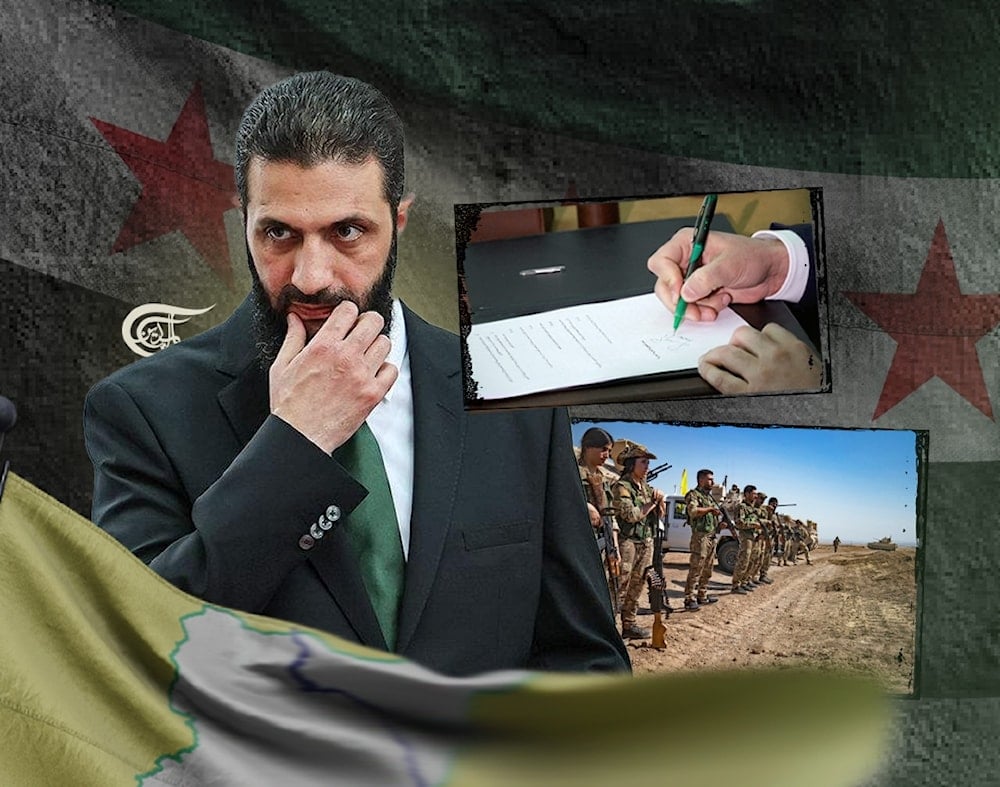After their agreement with Al-Sharaa, the Kurds are not satisfied with the constitutional declaration
Protesters raised slogans denouncing the reliance on Hay'at Tahrir al-Sham officials for all appointments and decisions and the failure to respond to any Kurdish demands.
-

The constitution declaration was met with harsh criticism from many Syrian groups, including the Kurds (Illustrated by Zeinab al-Hajj; Al Mayadeen English)
While attention was focused on the atrocities and massacres committed by armed factions against civilians on the Syrian coast earlier this month, on March 10, interim President Ahmad al-Sharaa concluded a surprising agreement, both in terms of content and timing, with the Syrian Democratic Forces (SDF), represented by Mazloum Abdi.
Damascus appears to be under significant pressure following events in the coastal region, in addition to its inability to secure the financial support it hopes to secure in order to cover repeated promises of a 400% salary increase and economic openness. This requires steps to encourage the United States to lift sanctions by signaling an openness to partnerships with all segments of society, including the Kurds.
It is also in the Syrian Democratic Forces' interest to gain local and international legitimacy by gaining recognition as a legitimate, effective military force on the ground. This will give them an opportunity to shed their terrorist label and provide the necessary conditions to integrate their institutions into the state structure and enter into a partnership with the current authorities in governing the country.
Washington is pressuring both sides to implement the agreement according to a mechanism that ensures no future confrontations between them, addresses Turkish demands, and simultaneously pushes Turkey to abandon its plan to eliminate the SDF militarily. If successful, this would pave the way for a complete US military withdrawal from Syria.
The eight-point agreement raised numerous questions, most notably regarding points two and four. The second point concerns the transitional president's recognition of what the agreement calls "the Kurdish community", considering it an indigenous entity and protecting its right to citizenship and all other constitutional rights.
The fourth point concerns substantial theoretical concessions from the Kurdish side, such as handing over border crossings, airports, and oil and gas fields to Damascus and integrating the civil and military institutions in northeastern Syria into the state administration. The nature of this "integration" remains unclear, as does whether it means the SDF's full integration into the army or whether it remains a parallel faction under a single central command, with the Kurds as a part of it.
No sooner had the agreement been announced than indications of continued disagreements began to emerge, with the Syrian Ministry of Defense announcing that a General Security convoy was heading to take over the prisons, a claim the SDF quickly denied.
Here, it's important to note the point everyone is wondering about: the fate of the thousands of ISIS members in Kurdish prisons. This was not made clear in the agreement. Will they be transformed into regular soldiers in the new army, similar to the presence of leaders and individuals of various nationalities within it, such as Uyghurs, Turkmens, Uzbeks, Jordanians, and Turks, so that the army takes on a global character rather than a Syrian one?
The second round of negotiations between the two parties on the integration mechanism will be held the week following the Eid al-Fitr holiday, amid reports of a preliminary agreement between the two parties to share oil production. It is said that the SDF will receive a third, while a portion of the oil will be sold to secure foreign currency.
However, it appears that other parties are unhappy with the agreement. A statement issued by the "Peninsula Shield Brigades" pledged to fight the SDF and target its headquarters and sites. They also called on the people of the eastern provinces to “unite, confront attempts to impose a repressive reality, and reshape the future with dignity.”
On the other hand, several days after the agreement was signed, the head of the transitional phase, Ahmad al-Sharaa, signed the Constitutional Declaration, which will serve as an interim constitution for the country for the next five years. The declaration was met with harsh criticism from many Syrian groups, including the Kurds, who considered it a form of strict centralized rule, given that it places all powers in the hands of the president. This, they said, "completely contradicts the content of the agreement with the SDF."
Thousands demonstrated, demanding a review of all decisions issued, from the National Dialogue, through the Constitution, to the National Security Council. They raised slogans denouncing the reliance on Hay'at Tahrir al-Sham officials for all appointments and decisions and the failure to respond to any Kurdish demands, including adopting Kurdish as a second language and naming the country the "Syrian Republic" instead of the Syrian Arab Republic.

 Katia Ibrahim
Katia Ibrahim
 5 Min Read
5 Min Read










